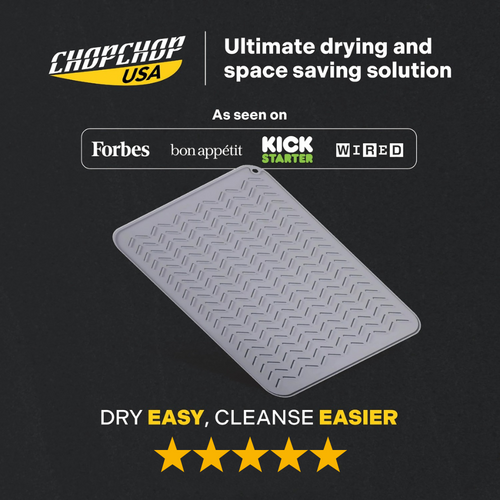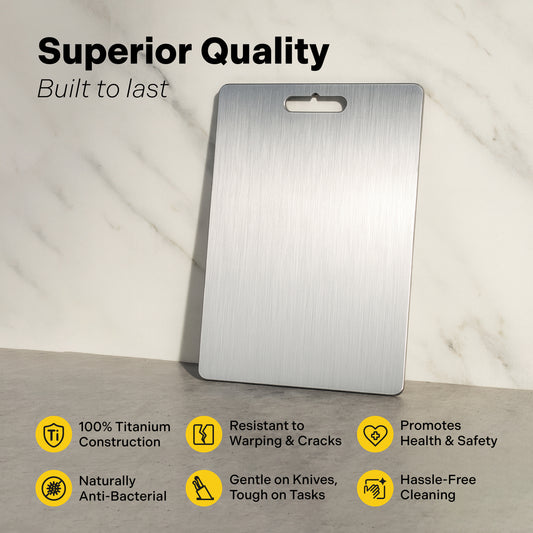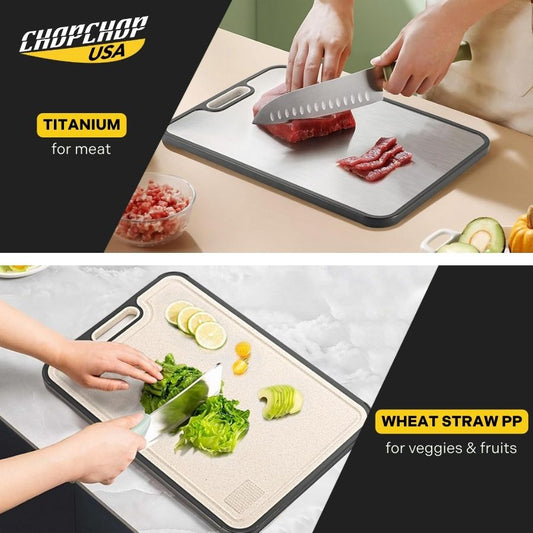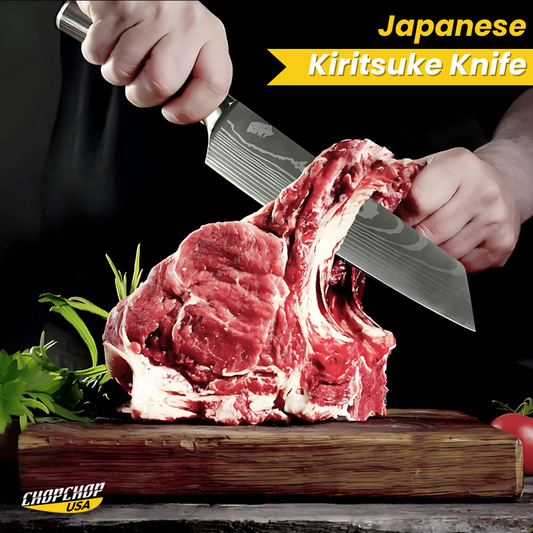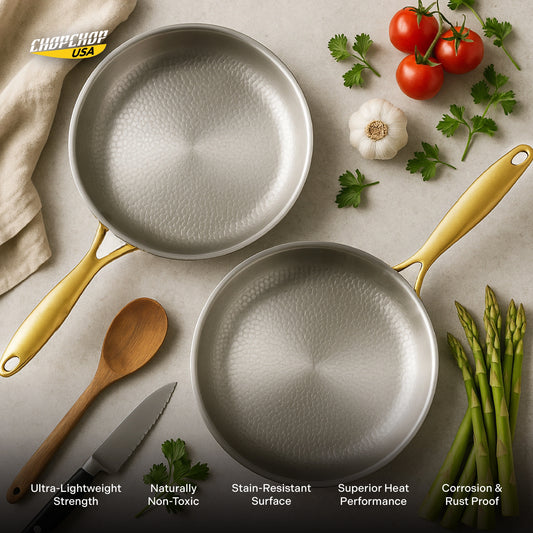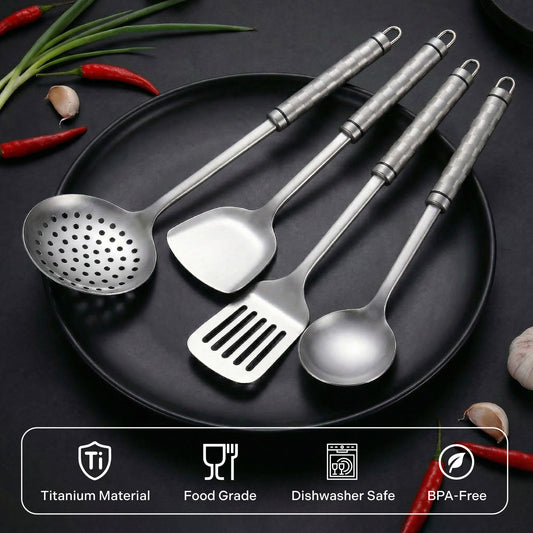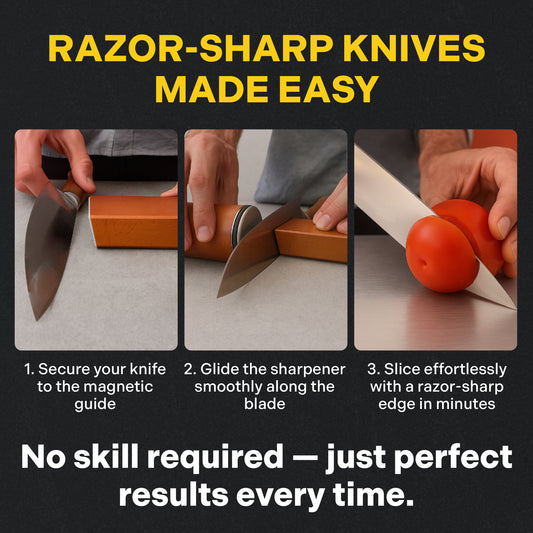What are mistakes that dull your knives? Common mistakes that dull knives include cutting on hard surfaces, using the wrong cutting board, improper storage, neglecting sharpening, and exposing blades to moisture or acidic foods.
In this guide, ChopChop USA highlights the most frequent mistakes that dull your knives and shares actionable strategies to prevent them. You’ll also learn about essential tools, such as cutting boards and premium knives, designed to preserve sharpness, maintain hygiene, and improve kitchen efficiency.
Common Mistakes That Dull Your Knives

Even the best knives can lose their edge if misused. Understanding common mistakes that dull your knives—from cutting surfaces to storage habits—helps preserve sharpness, protect blades, and maintain kitchen efficiency.
By learning which mistakes that dull your knives are most frequent, home cooks can take proactive steps to avoid unnecessary wear, extend blade life, and maintain precision during daily prep work.
Using Hard Cutting Surfaces
Cutting directly on stone, glass, or ceramic is a leading cause of dull knives. These hard surfaces chip or roll edges, reducing efficiency and making tasks more difficult. Many home cooks overlook this mistake, but it ranks among the top errors that dull knives.
Switching to a wooden or quality composite cutting board reduces friction and protects the blade. Avoiding hard surfaces helps minimize mistakes that dull your knives, preserves sharpness, and ensures cleaner, safer cuts for vegetables, fruits, and proteins.
Putting Knives in the Dishwasher

Dishwashers expose knives to high heat, strong detergents, and constant movement, all of which degrade blades. This frequent error not only dulls knives but may also damage handles or loosen rivets, significantly shortening the overall lifespan of your kitchen tools and increasing the risk of mistakes that dull your knives.
Hand washing protects the blade and prevents common mistakes that dull your knives. Carefully cleaning with mild soap and drying promptly preserves sharpness, maintains hygiene, and keeps knives performing like new for longer. Gentle handling ensures safety, durability, and consistent cutting efficiency in every kitchen task.
Improper Storage
Storing knives loosely in drawers or mixed with other utensils significantly increases the risk of nicks, edge rolling, and accidental injuries. Improper storage is one of the most frequent contributors to mistakes that dull your knives, compromising blade integrity and overall safety in the kitchen during everyday meal preparation.
Knife blocks, magnetic strips, and protective sheaths are essential tools that help prevent mistakes that dull your knives. By keeping blades secure, organized storage ensures easy access to the correct knife, protects edges from damage, and maintains sharpness over time, allowing safer, more efficient, and precise cutting in home and professional kitchens alike.
Using the Wrong Knife for the Task
Slicing bread with a chef’s knife or chopping bones with a paring knife places unnecessary stress on edges. Misusing knives is a classic example of common mistakes that dull blades and reduces the overall lifespan of your kitchen tools.
Choosing the right knife for each task reduces mistakes that dull your knives. Specialized tools like bread knives, cleavers, and utility knives preserve edge integrity, improve efficiency, and make prep work safer and more precise.
Scraping the Blade
Scraping knives against plates, pans, or countertops chips and rolls edges, making this a surprisingly common mistake that dulls blades quickly. Many home cooks unintentionally harm their knives while transferring ingredients between surfaces.
Use the flat side of the knife or a silicone spatula instead to avoid mistakes that dull your knives. Minimizing contact with hard surfaces preserves sharpness, prolongs blade life, and ensures cleaner, safer cuts.
How to Avoid Dulling Your Knives

Keeping knives sharp requires more than frequent sharpening. Learn practical tips—from choosing the right cutting board to proper storage and cleaning—to avoid dulling and extend your knife’s lifespan.
Use a proper cutting board

Use a cutting board made from wood, soft composite, or a double-sided titanium cutting board. These surfaces protect knives from dulling, provide stability, preserve sharpness, prevent edge damage, and reduce wear from hard surfaces.
The ChopChop USA Double-Sided Titanium Cutting Board protects your knives while making prep easier. The titanium side is non-reactive and corrosion-resistant, ideal for heavy-duty meat chopping, while the wheat fiber side is lightweight and perfect for fruits, vegetables, and bread.
Durable and knife-friendly, it resists warping, cracking, and bacteria buildup. Made from food-grade titanium and biodegradable wheat fiber, it’s eco-friendly and safe. Dishwasher safe and easy to clean, this board preserves your blades, reduces mess, and lasts for years, helping you avoid common mistakes that dull your knives.
Hand-Wash Immediately

Always wash knives by hand using mild soap and warm water, then dry them promptly. Avoid letting moisture sit on the blade, as prolonged exposure can cause corrosion, discoloration, and dulling. Gentle handling preserves both sharpness and the knife’s overall quality.
Hand-washing also protects handles and rivets from loosening or damage. Even stainless steel blades can degrade over time if exposed to dishwashers or harsh detergents. Treating knives carefully ensures longer-lasting performance, safety, and value, keeping them razor-sharp for daily kitchen tasks.
Use the Correct Knife for the Job
Using the wrong knife for a task puts unnecessary stress on the blade, accelerating dulling. Paring knives are ideal for small, precise cuts, bread knives for slicing loaves, and chef’s knives for versatile chopping. Correct selection preserves edge integrity and efficiency.
Matching the knife to the task reduces wear and enhances cutting accuracy. Using specialized knives like cleavers or utility knives as intended prevents mistakes that dull your knives, improves workflow, and ensures safer, more enjoyable prep work in both home and professional kitchens.
Store Knives Properly

Storing knives loosely in drawers increases the risk of edge rolling, nicks, and accidents. Improper storage is a frequent contributor to dulling and compromises kitchen safety, making proper organization essential for maintaining knife performance and preventing damage.
Knife blocks, magnetic strips, or protective sheaths keep blades secure, reducing the chance of accidental contact with other utensils. Organized storage ensures quick access to the right knife, prevents misuse, and extends the life of your knives while maintaining a safe and tidy kitchen environment.
Avoid Scraping
Scraping knives against plates, countertops, or pans chips and rolls edges, gradually dulling blades. This is a subtle but common mistake many home cooks make when transferring ingredients, leading to inefficient cutting and unnecessary wear.
Instead, use the flat side of the knife or a silicone spatula when moving food. Minimizing contact with hard surfaces protects the blade, preserves sharpness, and prolongs the knife’s life, ensuring clean, precise, and safe cutting every time.
Hone and Sharpen Regularly
Honing realigns the blade edge, while sharpening restores it. Frequent maintenance prevents dulling and keeps knives performing optimally. Even high-quality knives require periodic care to maintain precision, minimize mistakes, and ensure efficiency during daily kitchen prep.
Neglecting routine honing or sharpening accelerates edge wear, reducing cutting efficiency and potentially damaging food. A consistent care routine preserves sharpness, improves safety, and prolongs the life of your knives, ensuring they remain reliable tools for years to come.
ChopChop USA Kiritsuke Knife – Sharpness and Durability

The ChopChop USA Kiritsuke Knife features a razor-sharp high carbon stainless steel blade, twice as hard as standard knives. It maintains exceptional sharpness for slicing, chopping, and mincing, providing precision and efficiency for both home cooks and professional chefs alike.
Its laser-tested edge ensures effortless cutting, boosting kitchen efficiency and reducing prep time. The ultra-sharp blade preserves ingredient quality and minimizes mistakes that dull your knives, making the ChopChop USA Kiritsuke Knife a reliable tool for any kitchen task.
Designed with an ergonomic, slip-resistant grip, the knife offers safety and control, minimizing slips and injuries. Measuring 12.4" x 7.9" x 4.5" and crafted from high carbon stainless steel, the ChopChop USA Kiritsuke Knife combines comfort, durability, and precision in one essential kitchen tool.
Perfect for precision chopping, dicing, or gourmet prep work. Experience professional-level performance in your home kitchen with ChopChop USA quality.
Conclusion
Avoiding common mistakes that dull your knives ensures sharp, safe, and efficient cooking. Proper cutting boards, storage, and maintenance extend blade life and improve kitchen performance.
ChopChop USA products, including the Double-Sided Titanium Cutting Board and Kiritsuke Knife, deliver durability, hygiene, and precision, keeping your knives razor-sharp and ready for any kitchen task while reducing mistakes that dull your knives.
FAQs
How to prevent knives from getting dull?
Use proper cutting boards, hand-wash immediately, store safely, hone regularly, and avoid scraping to keep knives sharp and effective.
What is the golden rule for knives?
Always use the right knife for each task, cut on safe surfaces, and store properly to prevent dulling and maintain safety.
What are the 5 knife safety rules?
Cut away from yourself; Keep knives sharp; Grip properly; Don’t catch falling knives; Store knives securely.
What not to do when sharpening a knife?
Avoid excessive pressure, metal surfaces, and skipping regular honing. Incorrect sharpening can ruin edges, making knives unsafe and less effective.
Why choose a Kiritsuke Knife?
The Kiritsuke Knife provides precision, durability, and versatility, ideal for home chefs and professionals seeking sharp, reliable, and efficient kitchen tools.


